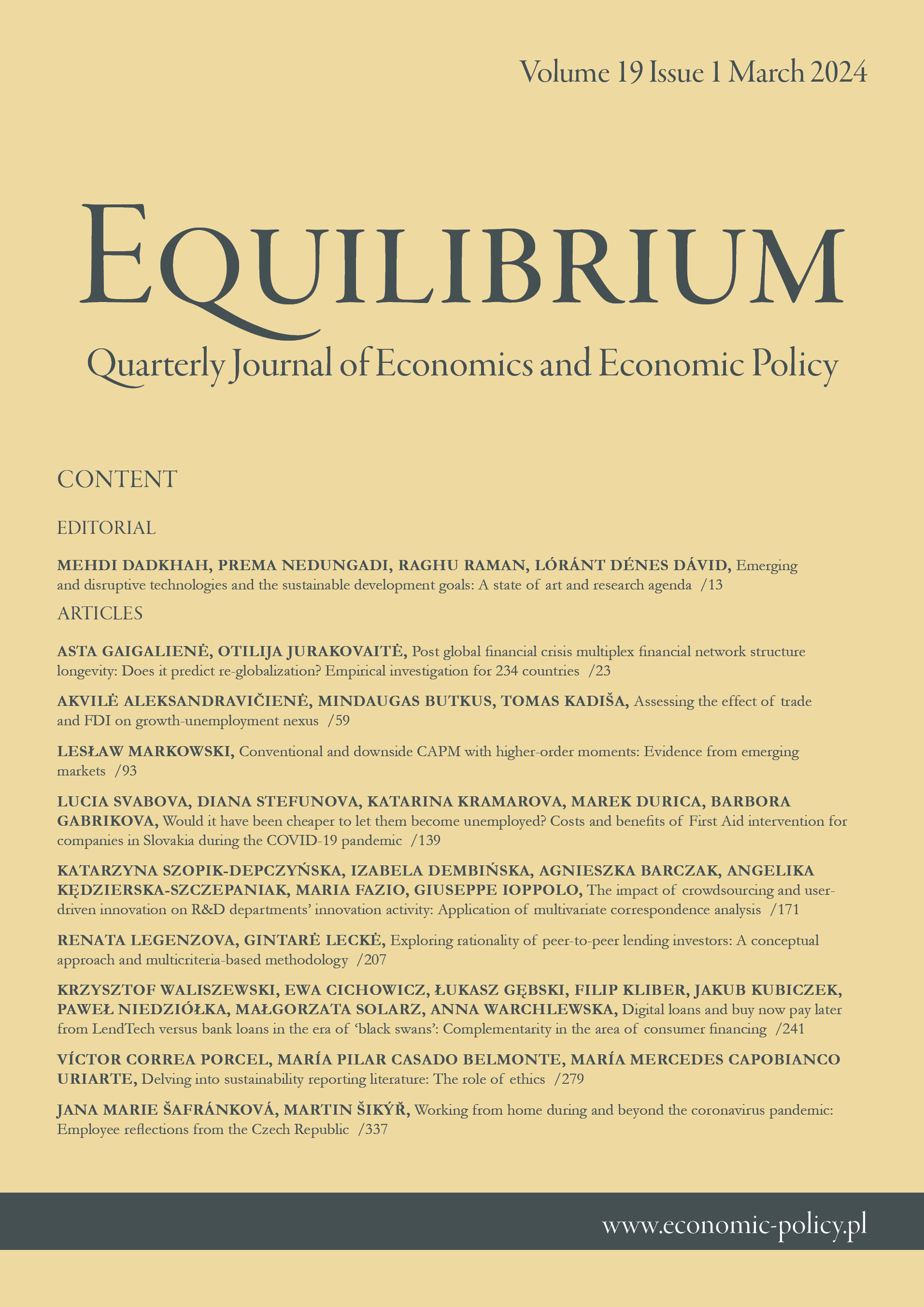Debt as a financial risk factor in SMEs in the Czech Republic
IF 5
Q1 ECONOMICS
Equilibrium-Quarterly Journal of Economics and Economic Policy
Pub Date : 2020-03-31
DOI:10.24136/eq.2020.005
引用次数: 20
Abstract
Research background: The approach is based on theoretical sources and completed studies on business debt, debt level and repayment awareness and how this issue relates to SMEs in the Czech Republic. Purpose of the article: The main purpose of this paper is to examine the attitude of SMEs towards the issue of company debt and its position within the economy. This attitude is an inherent part of the company´s risk management. Methods: Three researched issues (How strongly is company debt perceived as a financial risk factor; Does the company consider debt to be a serious matter in their business; What measures does the company take to reduce risk) supported by hypotheses, which verified the thesis, were statistically tested. Finding & Value added: Practical implications confirm the thesis that there is a belief that SMEs do not consider debt to be a critical factor of business risk and do not associate it directly with the major risk of business failure. SMEs do not view debt negatively and do not directly link debt to the risk of failure. Consequently, companies consider the risk of indebtedness as relatively insignificant. Their approach to indebtedness is therefore generally passive and they also believe that it will not jeopardize their business, and they will always somehow manage to solve it through insurance, risk avoidance and through creation of financial reserves.债务作为捷克中小企业的金融风险因素
研究背景:该方法基于理论来源和已完成的关于企业债务、债务水平和还款意识的研究,以及这个问题与捷克共和国中小企业的关系。文章的目的:本文的主要目的是研究中小企业对公司债务问题的态度及其在经济中的地位。这种态度是公司风险管理的固有组成部分。方法:研究三个问题(公司债务被视为财务风险因素的程度;公司是否认为债务是其业务中的一个严重问题?公司采取了哪些措施来降低风险)通过假设支持,验证了论文,并进行了统计检验。发现和增值:实际意义证实了这一论点,即有一种观点认为,中小企业不认为债务是企业风险的关键因素,也不直接将其与企业失败的主要风险联系起来。中小企业不会消极看待债务,也不会将债务与失败风险直接联系起来。因此,公司认为负债的风险相对不重要。因此,他们处理债务的方法通常是被动的,他们也相信这不会危及他们的业务,他们总能通过保险、风险规避和创造金融储备来设法解决这个问题。
本文章由计算机程序翻译,如有差异,请以英文原文为准。
求助全文
约1分钟内获得全文
求助全文
来源期刊
CiteScore
9.20
自引率
3.50%
发文量
28
审稿时长
36 weeks
期刊介绍:
Equilibrium. Quarterly Journal of Economics and Economic Policy is a scientific journal dedicated to economics, which is the result of close cooperation between the Instytut Badań Gospodarczych/Institute of Economic Research (Poland) and Polish Economic Society and leading European universities. The journal constitutes a platform for exchange of views of the scientific community, as well as reflects the current status and trends of world science and economy.
The journal especially welcome empirical articles making use of quantitative methods in: Macroeconomics and Monetary Economics, International Economics, Financial Economics and Banking, Public Economics, Business Economics, Labor and Demographic Economics, Economic Development, and Technological Change, and Growth.
Current most preferable topics and special issues:
The economics of artificial intelligence: business potentials and risks;
Digitalization and entrepreneurship in economics;
Sustainable socio-economic development, environmental and ecological economics;
Transition in the energy market (improving energy efficiency, alternative energy sources, renewable energy, energy security).

 求助内容:
求助内容: 应助结果提醒方式:
应助结果提醒方式:


